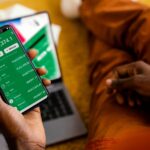Sunday Manasseh was only seven years old when he had high typhoid and malaria, which led to his loss of sight. Manasseh’s visual impairment promptly cut short his education as he was stuck at home trying to figure out a way to manage his circumstances.
“After I returned home, I could not see again; this happened in the year 2003. I was writing my promotional exam from primary 3, going to primary 4. It happened to be a problem that wasted my entire 8 years at home.”
At least 2.2 billion people in the world have a near or distance vision impairment, according to the World Health Organization.
Dr. Ogechi Cecilia Chukwu, an optometrist at St. Cecilia Eye Clinic, confirmed that malaria and typhoid can affect the eyes. “Cerebral malaria affects the brain and can damage the blood vessels in the eyes leading to blindness,” she said.
Manasseh’s parents struggled to get him back into school after months of learning to use Braille and typewriter machines.
“From 2003 to 2011, my parent discovered a school called Christian Mission in Maryland, Kogi State and I was admitted in 2011 where I learned how to use Braille and typewriter machines. I used three terms to acquire that, and I was admitted into JSS 1 in 2012.”
The 29-year-old, who has just begun a master’s degree at the Federal University of Lafia, said he still has dreams of becoming an academic doctor.
“It has not been easy because you have to push along in order to meet up. The challenge is not a platform to sit idle, and there is something that I know: there is ability in disability. What you plan to do in this life, with your courage, you will get it done; disability is not an excuse for being helpless, you can help yourself.”
He noted that mobility was his major challenge, adding that he often depended on a guiding cane.
Depression without aids
According to the World Health Organisation, adults with vision impairment can experience lower chances of employment, leading to higher rates of depression, anxiety, and other psychological disorders.
The WHO 2011 World Disability Report states that about 15 percent of Nigeria’s population, or at least 25 million people, have a disability. Facing several human rights abuses including discrimination and violence, many people with disabilities lack access to social amenities.
Manasseh admitted to feelings of depression, usually when he had no aid around for assistance. He recounted an unmemorable event in his hometown when he tried to have his SIM card registered.
“Time without number I have been denied some rights because of my challenge. I don’t want to call names but there was one of these telecommunication companies I went for SIM card registration in Kogi State and I was told I could not be captured. According to them, the blinking of my eyes is not up to the standard to be captured.
“I felt so bad that very moment because they should have captured my friend in my place. I felt so bad to the extent that I called that telecom company office and questioned such a law in place; if disabled ones can’t use their phone anymore? Why? However, I was told that the agent who attended to me was very wrong.”
Manasseh’s unfair treatment at the SIM booth is a stark disregard for the 2018 Discrimination Against Person With Disability (Prohibition) Act, which states that “a person with disability shall not be discriminated against on the ground of his disability by any person or institution in any manner or circumstance.”
Offenders of the Act are liable to “a fine of N1,000,000; and… a fine of N100,000 or six months imprisonment or both.”
Determined to succeed
Amid the odds, Manasseh is resolved to become an academic doctor before he turns 32.
“I have this mindset that I can become who I want to be or who God wants me to become. That is why I have not given up in life.
“There is ability in disability. One thing I know for sure is all about mindset, if you know where you are going; your past is behind you, learn from it because there is nothing you can do about it. The present is now, you may not do anything about it. The future is ahead, prepare for it.”
He added, “To the able ones, saying there is no one to support you, that is not the gospel truth. Most of the questions that the helpers do ask are, ‘How much do you want’ and ‘How much do you have’. You must try your possible best to have something for a start. God will always bless the works of our hands.”





